
Henry William Thompson was an American country music singer-songwriter and musician whose career spanned seven decades.
Country USA was a 23-volume series issued by Time-Life Music during the late 1980s and early 1990s, spotlighting country music of the 1950s through early 1970s.

"Oklahoma Hills" is a song written by Woody Guthrie. In 2001 it was named the official Folk Song of the state of Oklahoma.

Leather and Lace is a duet album by Waylon Jennings and Jessi Colter, released on RCA Records in 1981.
Harold Lee Chalker, known professionally as Curly Chalker, was an American pedal steel guitarist.
"I Don't Hurt Anymore" is a 1954 song by Hank Snow. It was written by Don Robertson and Jack Rollins.
"That's All There Is to That" is a song written by Clyde Otis and Kelly Owens and performed by Nat King Cole featuring The Four Knights. It reached #15 on the U.S. R&B chart and #16 on the U.S. pop chart in 1956. The song reference's Ethel Barrymore's phrase to rebuff curtain calls, "That's all there is, there isn't any more".

"Cincinnati Lou" is a country music song recorded by Merle Travis and released on the Capitol label. It was co-written by Travis and Shug Fisher.
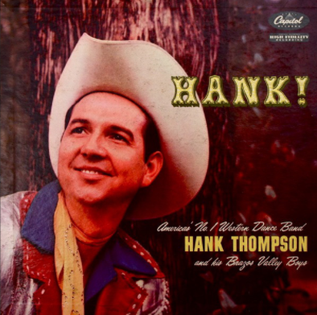
Hank! is a studio album by country music artist Hank Thompson and His Brazos Valley Boys. It was released in 1957 by Capitol Records.
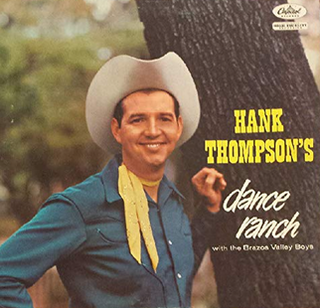
Dance Ranch is a studio album by country music artist Hank Thompson and His Brazos Valley Boys. It was released in 1958 by Capitol Records.

Favorite Waltzes is a studio album by country music artist Hank Thompson and His Brazos Valley Boys. It was released in 1959 by Capitol Records.
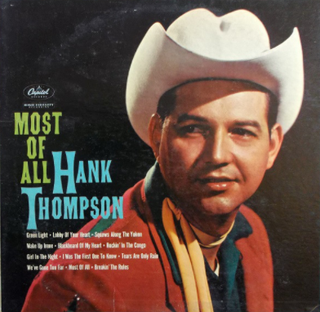
Most of All is a studio album by country music artist Hank Thompson and His Brazos Valley Boys. It was released in 1960 by Capitol Records. Ken Nelson was the producer.
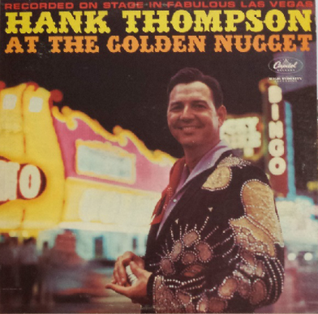
Hank Thompson at the Golden Nugget is a live album by country music artist Hank Thompson and His Brazos Valley Boys. It was released in October 1961 by Capitol Records. Ken Nelson was the producer.

Golden Country Hits is an album by country music artist Hank Thompson and His Brazos Valley Boys. It was released in 1964 by Capitol Records. Ken Nelson was the producer.
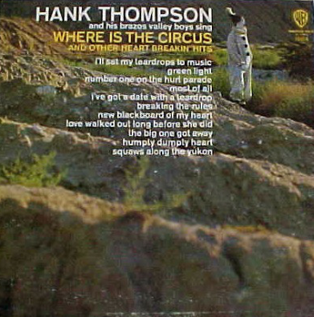
Where Is the Circus (And Other Heart Breakin' Hits) is an album by country music artist Hank Thompson and His Brazos Valley Boys. It was released in 1966 by Warner Bros. (catalog no. W1664). Joe Allison was the producer.

A Six Pack to Go is an album by country music artist Hank Thompson and His Brazos Valley Boys. It was released in 1966 by Capitol Records. Ken Nelson was the producer. The album consists of 12 songs related to drinking.
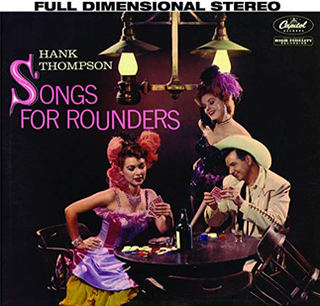
Songs for Rounders is an album by country music artist Hank Thompson and His Brazos Valley Boys. It was released in 1959 by Capitol Records. Ken Nelson was the producer. It was Thompson's first stereo album.

On Tap, in the Can, or in the Bottle is an album by country music artist Hank Thompson and the Brazos Valley Boys. It was released in 1968 by Dot Records. Joe Allison was the producer.

Smoky the Bar is an album by country music artist Hank Thompson and the Brazos Valley Boys. It was released in 1969 by Dot Records. Joe Allison was the producer. It is an album of songs related to drinking, partying, and bars.
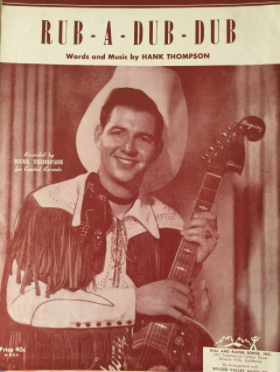
"Rub-A-Dub-Dub" is a country music song written by Hank Thompson, performed by Thompson and his Brazos Valley Boys and released on the Capitol label. It is based on the 18th century nursery rhyme, "Rub-a-dub-dub". It was Thompson's second hit record based on a nursery rhyme, following his 1948 recording of "Humpty Dumpty Heart".
















